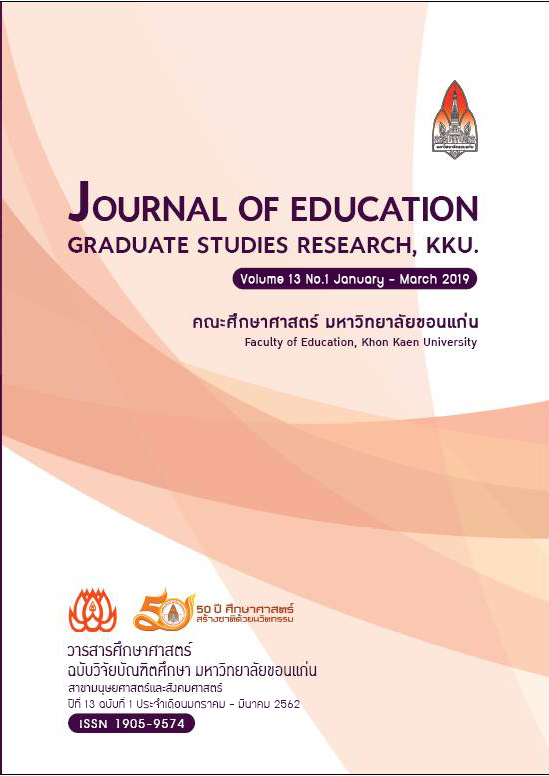The Effect of Field Trip Method toward the Enhancement of Social Interaction Ability of Children with Moderate Mental Retardation in Grade 4 of SDLB
Main Article Content
บทคัดย่อ
This study aimed at implementing a new method to overcome social interaction problem of students with moderate mentally retarded in which the method was field trip. It could be a good choice to enhance students’ social interaction. It might handle the students’ boredom of indoor learning. It also enabled the students to experience occurrences and see objects directly. Moreover, field trip method could make the students more proactive since they could see, hear, observe and experiment a real object directly.
This study employed experimental design with Single Subject Research (SSR) method. There were two phases of this study: baseline (A) and intervention (B) or treatment. There were five study sections in baseline phase (A) and seven study sections in intervention phase (B). Every section was conducted in different day by giving several days as interlude before go to the next section. This study used two measurements of dependent variable: percentage and frequency.
Based on the findings, it could be concluded that the implementation of field trip method enhance social interaction ability of children with moderate mentally retarded fourth graders of SDLB Arya Satya Hati Pasuruan. The students’ social interaction ability in percentage tended to decline in baseline phase (A) which was 44% to 40%. Then, it increased in intervention phase (B) which was 70% to 89%. In the form of frequency, the subject’s value in baseline phase (A) declined at 14 to 12 and increased in intervention phase (B) at 31 to 37. Meanwhile, the overlap percentage was 0% which meant the intervention in the form of field trip method had a positive effect toward the social interaction ability of children with moderate mentally retarded.
Thus, field trip method should be implemented in social interaction learning of children with mentally retarded, especially moderate mentally retarded. For the next researchers, it is suggested that the same study about the implementation of field trip method is not only used for social interaction learning, but also different goal. It should be conducted in term of different subjects and behaviour target.
Article Details
เอกสารอ้างอิง
Abdurrahman, M. (2003). Pendidikan Bagi Anak Berkesulitan Belajar. Jakarta: PT Asdi Mahasatya.
Andin, S. (2013). Media Komunikasi Pendidikan. Jakarta: Bumi Aksara.
Djamarah, S. B. D. & Zain, A. (2010). Strategi Belajar Mengajar. Jakarta: PT Rineka Cipta.
Efendi, M. (2009). Pengantar Psikopedagogik Anak Berkelainan. Jakarta: PT Bumi Aksara.
Gerungan, W. A. (2004). Psikologi Sosial. Bandung: PT Refika Aditama.
Kuswana, W. S. (2011). Taksonomi Berpikir. Bandung: PT Remaja Rosdakarya.
Mangunsong, F., et al. (2009). Psikologi and Pendidikan Anak Berkebutuhan Khusus. Jakarta: Lembaga Pengembangan Sarana.
Maryati, K., & Suryawati, J. (2001). Sosiologi untuk SMA and MA Kelas X. Jakarta: Erlangga.
Maryudi. (2006). Kemampuan, Kecerdasan, and Kecakapan Bergaul. Jakarta: Restu Agung.
Muin, I. (2006). Sosiologi SMA/ MA Jilid 1 untuk SMA/ MA Kelas X. Jakarta: Erlangga.
Reid, G. (2009). Memotivasi Siswa di Kelas. Jakarta: PT Indeks.
Roestyah. (2008). Strategi Belajar Mengajar. Jakarta: PT Rineka Cipta.
Sartika, W., et al. (2013). Masalah-masalah Interaksi Sosial Siswa dengan Teman Sebaya di Sekolah. Jurnal Ilmiah Konseling, 2(1), 141.
Sofinar. (2012). Perilaku Sosial Anak Tunagrahita Sedang. Jurnal Ilmiah Pendidikan Khusus, 1(1), 134.
Somantri, T. S. (2007). Psikologi Anak Luar Biasa. Bandung: PT Refika Aditama.
Sukardi, M. & Astuti W. (2013). Kajian Perkembangan Kognitif Anak Usia Dini. Malang: Fakultas Ilmu Pendidikan Universitas Negeri Malang.
Sunanto, J., et al. (2005). Pengantar Penelitian Dengan Subjek Tunggal. Tsukuba: CRICED University of Tsukuba.
Suparno, et al. (2007). Pendidikan Anak Berkebutuhan Khusus. Jakarta: Direktorat Jendral Pendidikan Tinggi Departemen Pendidikan Nasional.
Tirtarahardja, U. & La Sulo, S. L. (2005). Pengantar Pendidikan. Jakarta: PT Rineka Cipta.
Wiyani, N. A. (2014). Buku Ajar Penanganan Anak Usia Dini Berkebutuhan Khusus. Yogyakarta: Ar-Ruzz Media.

